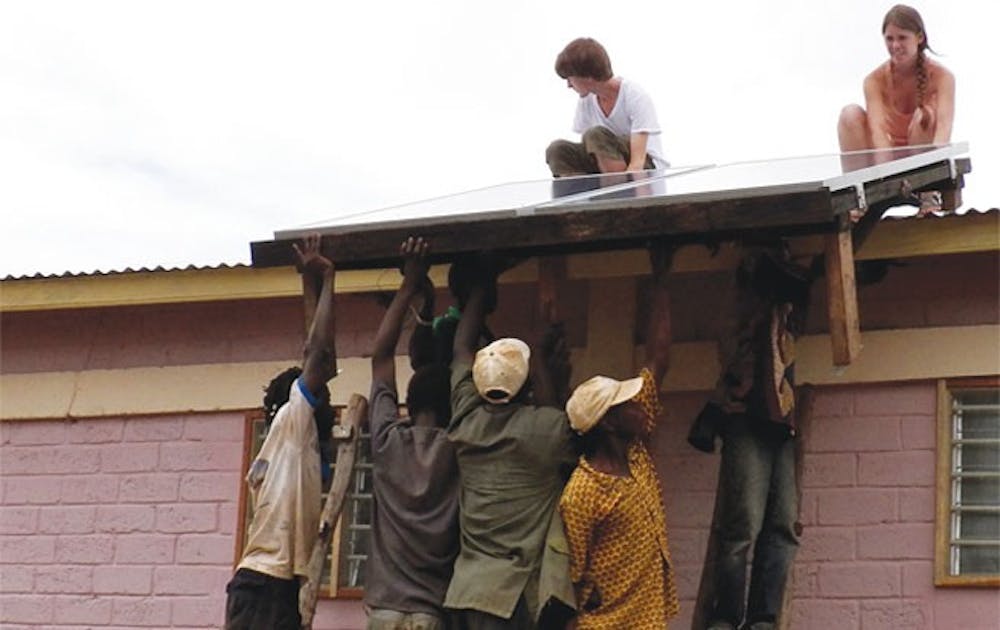Thanks to the efforts of two Duke students, a village in rural Togo can now use the Internet.
This past summer, senior Kathleen Ridgeway and junior Connor Cotton constructed an internet-equipped computer center in the rural village of Farendé, Togo. They designed the center to be powered sustainably with solar panels and to generate ongoing revenue for local development. Ridgeway and Cotton spent months fundraising and planning their project before arriving in Togo.
“Providing students with affordable access to the Internet in Farendé will give them the opportunity to learn and succeed in a way that the under-resourced schools do not currently allow,” Ridgeway said. “Academic success will increase their chances of pursuing higher education and ultimately of finding long-term employment that will help to improve their village’s economic situation over the long term.”
Ridgeway and Cotton operated with funding from DukeEngage, which supports independent projects as well as its existing programs around the world.
Professor of cultural anthropology Charles Piot served as mentor for the project. Piot has worked as an anthropologist in northern Togolese villages for more than 25 years.
“[The computers are] stunning to see in this context,” Piot said. “This project has the potential to be transformative in this area, connecting youth to the Internet and the world beyond—and helping to stem the drain of youth away from the villages.”
Ridgeway spent time in Togo the previous summer after she received an Aalok S. Modi Global Health Fieldwork Fund award which allowed her to live in Farendé and research Togo’s traditional healing system. Working with village’s healers and living with a host family, Ridgeway learned about the community’s education system and recognized the many challenges it faces, such as lack of resources and low teacher salaries. Ridgeway said her positive experience and observations of the failing education system fueled her desire to return.
“I felt a powerful connection to the area and wanted to demonstrate my gratitude for my host community’s openness through making some sort of direct contribution to Farendé,” she said.
She and Cotton—who has spent time working in an alternative energy research laboratory and leading renovation and repair projects on rural Virginia homes—decided to join forces to build the computer center.
Recently, the Togolese government withdrew nearly all the social services it provided rural communities. This governmental neglect has exacerbated the poor economic circumstances the villages face, Cotton noted. In response, Farendé has implemented a Committee for Community Development to help address these issues.
Given the current economic dilemma, Ridgeway and Cotton saw a greater opportunity for their project. By charging a small fee for computer usage, the computer center they built can now be a business. Its profits will go directly to Farendé’s Committee for Community Development in order to back community initiatives.
For five months, the students raised money for their project and accumulated and shipped supplies, including solar panels, laptop computers and power invertors. Once in Togo, they designed and carried out renovations to the building’s roof, installed the solar panels and assembled and tested the whole system.
Without any electricity, local technicians or infrastructure for support, the students worked almost entirely on their own.
“We relied entirely on Connor’s previous experience in engineering and construction to design the more technical aspects of the project,” Ridgeway said. “Because of my previous experience in the village and my personal connections with its inhabitants, I was responsible for handling the communication aspects of the project.”
Ridgeway and Cotton noted that although the project was challenging, they both had very positive experiences.
“This was the hardest thing I have ever been able to accomplish,” Cotton said. “As the only engineering student to go to Togo through Dr. Piot’s program, I saw the village in very different terms from the global health and cultural anthropology students who had gone before me. When working on the engineering aspects of the project in the field, I had no guidance and had to rely only on myself, which was definitely a learning experience.”
Get The Chronicle straight to your inbox
Signup for our weekly newsletter. Cancel at any time.

